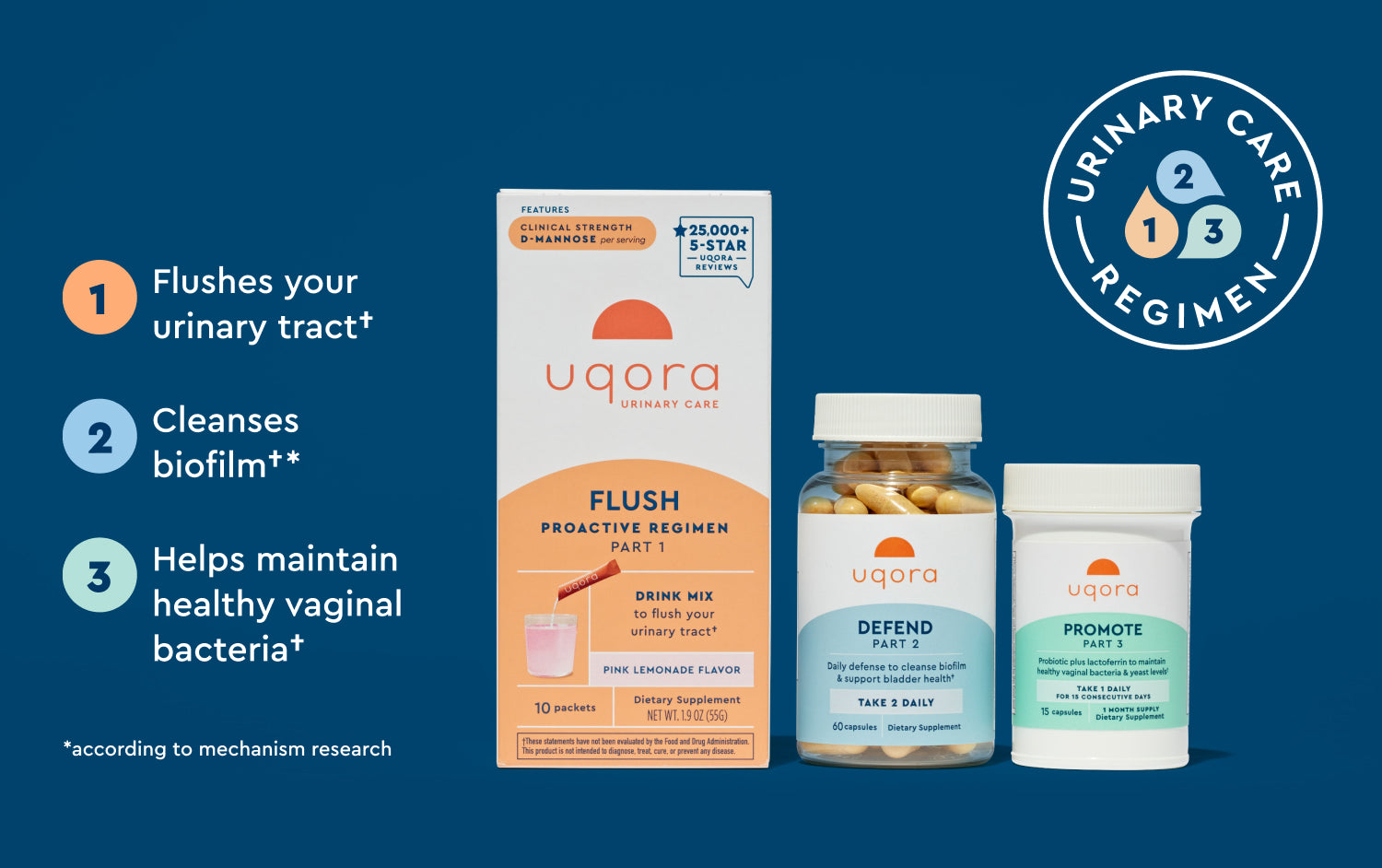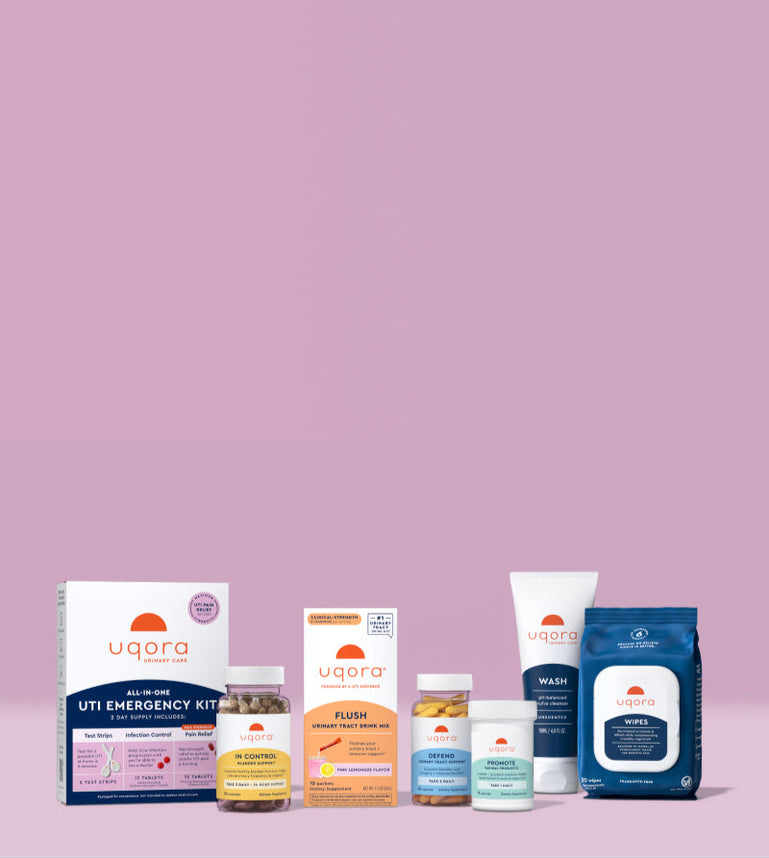
Stuck in a vicious UTI cycle?
You're not alone.
We're Uqora — we know the importance of urinary tract health
and are here to help you get back on track.
Why do you keep getting UTIs?
Although everyone's anatomy is slightly different, some factors make certain people more susceptible to UTIs than others. For example, simply having a female anatomy increases your risk of getting a urinary tract infection by 30% since women have shorter urethras than men. Understanding your unique triggers so you can take preventative steps is key to breaking the cycle of recurring infections.
Select a topic to learn more about common UTI triggers
Sexual Activity
Sexual activity is the most commonly reported cause of UTIs. During sexual activity, bacteria, most commonly e. coli, are transferred from the vagina, anus, or sexual partner to the urinary tract. Any form of sexual activity physically moves or transplants bacteria to the urethra, where they can travel up and establish an infection. The longer the time the bacteria have to travel up the urinary tract, the more likely an infection is. This is why peeing after sex is always a good idea. However, this is not always enough to keep bacteria from traveling through the urinary tract.
Exercise
Sweat and moisture allow bacteria to move around when exercising, which can transfer them to the urethra. If the clothes worn while exercising are not breathable, this typically increases moisture and makes bacterial travel more likely. Exercising and then not showering for an extended period of time will allow bacteria more time to travel before washing.
Holding It
Our first line of defense against bacteria entering the urinary tract is physically flushing them out via urination. The more time that we allow bacteria to travel up the urinary tract (aka the longer we hold it), the higher the risk of UTI. This is also why people with certain professions, like teachers, nurses, and more, who may not be able to use the bathroom as frequently as they’d like, may experience higher rates of UTIs.
Menstruation
Many women report getting UTIs cyclically immediately following their period due to the important role the vaginal ecosystem plays in your overall urinary heatlh. As blood and tissue from the uterus travel through the vagina, the vagina becomes much less acidic creating a better environment for bacteria growth. Changes in hormones during your period also alter the PH levels of the vaginal microbiome making it more vulnerable. Research also shows that more frequent changing of feminine hygiene products during menstruation can help decrease the risk of UTIs.
Menopause
As women enter menopause, UTI risk goes up. During menopause, estrogen production declines. This leads to big changes in the vaginal microbiome and a decline in lactobacilli (good bacteria). With a decrease of good bacteria, e.coli that is introduced has a higher presence and can increase frequency of UTIs.
Travel
Long airplane rides with limited restroom breaks can increase UTI risk. Additionally, a long travel day might mean you are wearing the same pair of underwear for an extended period of time. We recommend bringing a pair of underwear to change into during your travel day if you are traveling for an extended period of time.
26-44% of females will experience a second UTI within 6 months of the initial infection
Why is that? Biofilm is to blame. Biofilm is a protective network of bacterial cells and compounds that acts as a shield to UTI causing bacteria. Once formed, Biofilm protects the bacteria from the immune system and even antibiotics. Because this bacteria is never cleared, it causes a relapse infection when it ends it's dormancy. A UTI caused by old bacteria left over from a previous infection is called a replace infection or a recurring UTI (rUTI).
The role of biofilm in a relapse infection
Today, around 77% of all UTIs are considered recurring UTIs
If you've had at least 3 episodes of UTIs in the previous 12 months or at least 2 episodes within the previous 6 months, then there's a high chance you are dealing with a recurring UTI. Because these chronic infections are caused by a different, more complicated mechanism, they require further diagnosis and treatment solutions. We always recommend to talking to your doctor if you think you are dealing with this type of an infection.
A note from our CEO: I had 8 UTIs in one year

I've been there—stuck in the awful cycle of UTIs. In 2014, I had 8 UTIs. I was miserable and repeatedly told there was little I could do to get ahead of the issue.
This experience inspired my husband and I to start Uqora. Built in collaboration with doctors and scientists, Uqora is dedicated to making UTI relief products that work. We also make best-selling urinary tract health supplements so you can finally get proactive.
Today, we’re helping thousands of people take control of their urinary health. We're so glad you’ve found us.
— Jenna Ryan, Uqora Co-founder
Ready to get proactive about your urinary tract health?


Each of our urinary tract health supplements in our Complete Regimen supports your urinary tract in a different way, helping you stay covered from all angles.
You've tried cranberry — now try something that works
You’re not alone. We're helping over 400,000 people of all ages stay healthy with our proactive urinary tract products.


Not sure which product
is right for you?
Take our 2-minute quiz to get started.
UTIs Happen — We've Got You Covered
That's why we created our UTI Emergency Kit. With this all-in-one bundle you can test if you have a UTI, quickly relieve pain and burning, and control the infection until you can see a doctor.
Trusted by doctors and scientists who believe in being proactive
-

Dr. Alyssa Dweck, Board-certified Gynecologist, CMO Bonafide Health, LLC
-

Dr. Katherine Klos, Urologist
-

Dr. Payal Bhandari, Functional Medicine M.D.
Uqora promises
Keep scrolling to hear what our community has to say
Below is a place for our customers to share stories. We stay out of it! These reviews are unfiltered and uncurated. You can also access these by clicking 'reviews' in the menu.












